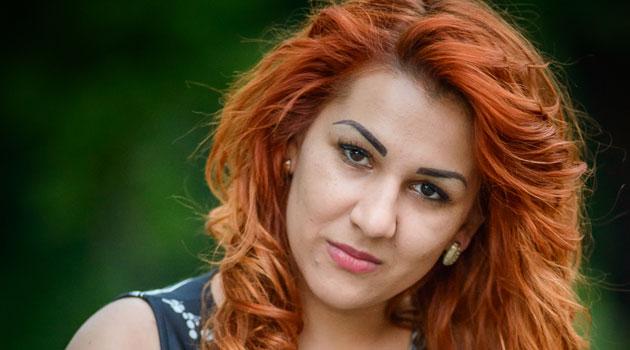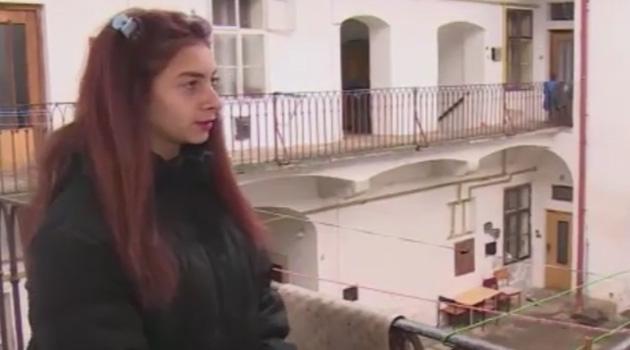Czech Republic: Romani law student from Slovakia says feeling her teachers cared about her future was a big help to her

Since January, news server Romea.cz has been publishing interviews with people making a contribution to interethnic coexistence under the series title “Together We Can”. Since May these interviews have begun to feature questions about some words that frequently seem to be losing their meaning because their definitions are no longer agreed on here – terms such as “Czech”, “gadjo“, “Rom”, etc.
Interview with Klaudie Vospálková
Klaudie Vospálková was born in Spišská Nová Ves, Slovakia. She is studying in her third year of law school in Brno, Czech Republic.
She collaborates with the Museum of Romani Culture, interns at a law firm, and sometimes publishes short pieces in the Romano hangos biweekly. Her mother tongue is Slovak and she has learned some Romanes through folk songs.
When she moved to Brno and realized that even some non-Romani people here speak Romanes, she decided to learn more. Last week she attended the Baruvas meeting of Romani high school and university students organized by ROMEA.
Q: What, in your opinion, needs to be done for us to live together well?
A: The basis is cooperation and mutual respect. If people respect each other then they manage to get along with each other.
Q: Do you have a concrete situation in mind?
A: For example, at school, during one’s education – I have completed primary and secondary school and now I am in my third year of tertiary education, and frequently it has happened to me that I have had to win others’ respect. I have never encountered direct discrimination, but I know that, for example, my fellow schoolmates said things about me behind my back that they would never say to my face.
Q: What do you think they said?
A: I believe they certainly used typical phrases like “Look at how that gypsy girl acts, how she gets along with the teacher and somehow gets nothing but good grades…” – typical kinds of insinuations. In the beginning, when I began at a new school, they believed my parents had certainly bribed the principal to get me there. From the teachers, I felt at the beginning – for example, when I started high school – that it was plain to see how frequently surprised they were by my answers to their questions, they had not anticipated such a performance from me. You could see it in their facial expressions, or they would stop me after class to praise me. If I had to explain why my fellow pupils respected me and never said anything negative to my face … I believe they didn’t dare because I was constantly obviously better and faster than anybody else. I never gave them the opportunity to be able to say I was different, or weaker, or worse, I was always one step ahead of them, which is why I have never encountered discrimination per se.
Q: When you say one step ahead, was that intentional behavior, or is that just your nature?
A: It’s my nature, I’m the pushy type, not that I am always promoting myself everywhere, but I simply do not give anybody else the opportunity to displace me from the situation I have managed to achieve. That’s how it works now. We must be faster than the others so we can have a good life.
Q: That seems a bit like a permanent struggle?
A: I am not an advocate of what other Romani people say, that they had to be “twice as good” as anybody else. That has never been the case for me. From the beginning, I have done my best to achieve good results because that’s my nature. I never had to do twice as much as everybody else just because I am Romani. I just did what I had to do, simply put, and I did it the best.
Q: You’re speaking a lot about the groups one deals with – studying, in a classroom, in a group that you haven’t chosen. Do you experience nice relationships, the kind we could call a “Together We Can” relationship, anywhere else?
A: That regularly happens to me on vacation, when we travel somewhere and are among people we don’t know. Different international camps where people from different countries meet each other. I love that – we gather, the animator comes and shouts something in English, and nobody has a problem grabbing somebody else by the hand and playing together, even if you’ve just seen the person for the first time and don’t even understand his language. Those situations feel really good.
Q: Recently I have begun asking people about some words that are complex and that sometimes distance us from each other – “Czech”, “gadjo“, “Rom”. How do you perceive these words?
A: It depends how people use them at home, in their families. That’s the environment one grows up in and knows the words from.
Q: What was used in your home?
A: The word cigán (“Gypsy”, in Slovak). It depends, naturally, in what context a word is used. It might appear a bit extreme, but there is a difference when that word is used by a non-Rom in a defamatory context, and when we Romani people use it among ourselves. For us, in our context, it does not mean we are abusing each other. On the other hand, I know that for me it’s because that word is frequently used in eastern Slovakia. I have many Romani friends from southern Slovakia who would never use the word “cigán”, but they do say “romák” (Roma).
Q: What does the word “cigán” mean to you? What is its color, its flavor?
A: It represents my identity, my origins. My heart.
Q: Would your heart be different if you were Czech, or Israeli?
A: If had to be born again I would not want to be reborn as anything but a Romani woman. I like our culture, our customs, our traditions, our upbringing.
Q: What do you love the most?
A: I love being home for Christmas. When we sit around the Christmas Eve table we all pray together and then my father speaks – but it’s not a general speech, he speaks directly to each of us. He talks about the year that each family member had, he talks about the bad and the good, about what he would have imagined differently, what surprised him. I remember that when we were children we put our school record books under the tablecloth [for luck] and my father, when he went into business, would put invoices under there. The custom was to give garlic for health and wealth so we would have money during the year to come.
Q: Do you have any dreams? If you had a magic wand, what would you conjure up?
A: I believe it is important for people to love each other. If all of us could love another person as much as we love ourselves, there would be no conflicts, wars, or stuff like that in the world.
Q: What can we do to achieve that? Where does it begin?
A: It’s important to raise our children that way, the beginning is the family and upbringing. People function all their lives according to how they are raised.
Q: Would you like to add anything else?
A: I would like to say that it is important not to let opportunities pass you by. I believe that all around us there are many people who want to aid us, and that it is important to accept their assistance.
Q: Can you give an example?
A: For example, at school, when the teachers would involve me in various competitions. Frequently they even forced me to compete – “You get good grades, you must go there.” In a way, that was aid for me. I got to know various areas of education, I constantly had the opportunity to meet new people, and then my results and successes pushed me forward.
Q: Do you think they did that to aid you?
A: They did it to advance me, and so it was a big assistance and support to me. I could have been a classic student, but they did their best to develop my potential. I actually say that the potential I have was given to me by my primary school – not the knowledge that I acquired, but the support of the teachers. When I applied to high school, all the teachers asked me about it, and all of them wanted to be involved, as if they were my own parents. What aided me was the feeling that I knew they would care about me even after I wasn’t “their” pupil at “their” school anymore.
